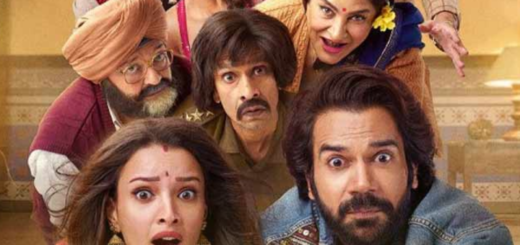Thamma Movie Review: Bold Myth, Great Visuals, Flawed Plot

Bollywood’s horror-comedy universe keeps growing, and Thamma arrives as its boldest, strangest, and most ambitious chapter. Directed by Aditya Sarpotdar and produced by Dinesh Vijan, the film features Ayushmann Khurrana, Rashmika Mandanna, and Nawazuddin Siddiqui in lead roles, with strong support from Paresh Rawal, Rajesh Sharma, and Sheeba Chaddha.
The movie released on 21 October 2025, right before Diwali — a slot that always promises family crowds and a festive vibe. After the success of Stree, Bhediya, and Munjya, audiences expected another thrilling, funny, emotional ride.
So, does Thamma deliver?
The short answer: partially yes. The film shines in concept, performances, and visual appeal. But it struggles with consistency, pacing, and emotional depth. Let’s dive into every aspect in detail.
Storyline & Plot
The film opens in a serene Himalayan village surrounded by deep forests. Alok Goyal (Ayushmann Khurrana), a spirited TV journalist, travels there to shoot a documentary on disappearing tribes. He doesn’t believe in myths or folklore; he only trusts evidence. His skepticism sets up the conflict perfectly.
During his trip, Alok encounters a strange bear attack in the forest. When he wakes up, he finds himself rescued by a woman named Tadaka (Rashmika Mandanna). She looks human but carries an otherworldly aura. She lives alone near the woods, avoids daylight, and speaks of an ancient tribe known as the Yakshas—creatures cursed to live between the human and spirit worlds.
As Alok spends time with Tadaka, he falls in love with her. But love comes with danger. Tadaka belongs to a supernatural clan led by Yakshasan (Nawazuddin Siddiqui), who wants to reclaim her to complete a dark ritual that could destroy humankind.
The rest of the story explores Alok’s struggle to save Tadaka, uncover the truth of her origin, and break a centuries-old curse that ties his destiny with hers.
The movie mixes folklore, love, reincarnation, and mythology. It also includes modern touches — environmental themes, technology vs. nature, and the power of faith.
Tone and Genre
Aditya Sarpotdar tries to merge horror, comedy, romance, and mythology — a combination that’s ambitious but risky. The first half leans toward fantasy-romance with subtle horror. The second half becomes heavier, darker, and more mythological.
The film doesn’t stay strictly in one tone. At times, it scares. Sometimes it makes you laugh. Other moments feel tragic or poetic. This tonal variety makes Thamma engaging but also inconsistent. Some viewers will enjoy the mix, while others might feel lost between laughter and lore.
Performances
Ayushmann Khurrana as Alok Goyal
Ayushmann brings his trademark charm, humor, and vulnerability to Alok. He plays the role like a believable everyman who slowly steps into something larger than life. His comic timing works well in the first half, especially in scenes with Paresh Rawal and Rajesh Sharma.
In emotional moments, Ayushmann delivers authenticity. He doesn’t overact. His eyes carry fear, confusion, and love convincingly. However, his transition from a skeptic journalist to a warrior against supernatural evil feels rushed. The script doesn’t give him enough internal development, so he sometimes feels reactive instead of proactive.
Rating for Ayushmann’s performance: 4/5
Rashmika Mandanna as Tadaka
Rashmika stands out in this film. She balances innocence and mystery beautifully. Her eyes express centuries of pain, while her playfulness makes her likable. She carries an otherworldly elegance that fits her character’s mythic nature.
She also handles the emotional intensity well. In several scenes, especially her confrontations with Yakshasan, Rashmika commands the frame completely. Her chemistry with Ayushmann feels natural and mature, not forced.
If the writing had deepened Tadaka’s backstory and emotional conflicts, her role could have become iconic. Even so, she remains one of the film’s strongest assets.
Rating for Rashmika’s performance: 4.5/5
Nawazuddin Siddiqui as Yakshasan
Nawazuddin plays the villain with flair and theatrical confidence. His performance sits somewhere between menacing and mischievous. He delivers his lines with a mix of sarcasm and power that only he can pull off.
However, his character lacks real motivation. The film gives him style but not substance. You enjoy watching him, but you never fear him. That weakens the climax.
Rating for Nawazuddin’s performance: 3.5/5
Paresh Rawal as Mr. Goyal (Alok’s father)
Paresh Rawal steals every scene he appears in. His comic timing remains razor-sharp, and his emotional beats add depth. His dialogues about faith, logic, and destiny bring balance to the story’s chaos.
He plays the rational father who refuses to believe in ghosts until the impossible happens. His reactions feel genuine, never exaggerated.
Rating for Paresh Rawal’s performance: 4.5/5
Supporting Cast
Rajesh Sharma and Sheeba Chaddha contribute well. They add humor and texture to the world. Some characters appear briefly but leave an impression — especially the forest priest and Tadaka’s tribe members.
Rating for supporting cast: 3.5/5
Direction & Screenplay
Director Aditya Sarpotdar takes creative risks. He wants to tell a grand, mystical story but still make it accessible to families. He designs a universe full of magic, rituals, and visual wonder. However, he doesn’t always maintain narrative control.
The first half flows smoothly — engaging setup, humor, chemistry, and intrigue. The second half gets cluttered. The script adds too many subplots and flashbacks that slow down the pace.
Aditya succeeds in creating atmosphere and tension, but he doesn’t sustain it. Some emotional payoffs come too late or feel underwritten.
The dialogues shine in moments of humor and philosophy but falter in exposition-heavy scenes. Characters often explain lore instead of letting it unfold naturally.
Rating for direction: 3.5/5
Rating for screenplay and writing: 3/5
Cinematography & Visual Effects
Cinematographer Amalendu Chaudhary captures stunning visuals. The mountain landscapes, fog-drenched forests, and tribal ruins look cinematic and eerie. Every frame feels rich with texture.
The color palette shifts cleverly — warm golden tones during romance, deep blues and reds during supernatural scenes. The lighting enhances mood without overwhelming the visuals.
The VFX looks strong in most sequences. The transformation scenes and the final battle showcase technical polish. However, a few moments of CGI — especially involving animal movements and energy blasts — look rushed.
Still, for a Bollywood production, the film maintains impressive visual quality throughout.
Rating for cinematography: 4.5/5
Rating for visual effects: 4/5
Editing & Pacing
The editing, done by Sanyukta Kaza, struggles in consistency. The first half feels crisp and energetic. The second half stretches unnecessarily. Certain scenes repeat information already shown.
The film runs for about 2 hours and 32 minutes, but tighter editing could have made it sharper by at least 15 minutes. Some songs interrupt the story’s rhythm, especially during the second act when tension should rise.
Despite this, the editor maintains smooth visual transitions and coherent action sequences.
Rating for editing and pacing: 3/5
Music & Background Score
The music by Sachin–Jigar gives the movie emotional flavor and energy. The soundtrack includes a mix of romantic, eerie, and dance numbers.
- “Rahein Na Rahein Hum” – a haunting melody that expresses Tadaka’s eternal loneliness. Rashmika’s expressions and Ayushmann’s chemistry make this song unforgettable.
- “Dilbar Ki Aankhon Ka” – a lighthearted number that adds relief after intense scenes.
- “Poison Baby” – an energetic club track used cleverly during a transformation montage.
The background score deserves applause. It builds tension in horror scenes and swells beautifully during emotional peaks. The music often says what the dialogues don’t.
Rating for music and BGM: 4.5/5
Strengths of the Film
- Unique Concept: The idea of combining ancient Indian mythology with a modern love story feels original and exciting.
- Strong Visual Design: Every frame looks grand and atmospheric. The film immerses you in its world.
- Lead Performances: Ayushmann and Rashmika carry the movie with sincerity.
- Music and Background Score: The songs enhance emotions, and the BGM deepens the tone.
- Emotional Potential: The core love story carries strong tragic beauty, even if underused.
Weaknesses of the Film
- Inconsistent Pacing: The movie loses steam in the second half and struggles to find rhythm again.
- Tone Confusion: It jumps between horror, comedy, and myth too abruptly.
- Shallow Writing: The mythology remains half-explained, leaving holes in logic.
- Weak Villain Arc: Yakshasan looks stylish but lacks emotional depth or motive.
- Underwhelming Climax: The final confrontation feels predictable and overly visual, not emotional.
Technical Overview
| Department | Strength | Weakness | Rating |
|---|---|---|---|
| Direction | Ambitious vision, strong visuals | Uneven control | 3.5/5 |
| Writing | Original premise | Weak structure | 3/5 |
| Acting | Excellent leads | Flat side characters | 4/5 |
| Cinematography | Gorgeous, moody frames | Slight CGI mismatch | 4.5/5 |
| Editing | Smooth transitions | Poor pacing | 3/5 |
| Music & BGM | Memorable songs | Slight overuse | 4.5/5 |
| Production Design | Rich and immersive | Occasionally excessive | 4/5 |
| Overall Impact | Entertaining yet flawed | Needs tighter writing | 3.5/5 |
Scene Highlights
- The Forest Rescue: The first meeting between Alok and Tadaka feels magical. Rashmika’s entrance glows under moonlight, creating instant intrigue.
- The Library Revelation: Alok discovers the origin of the Yakshas through ancient scriptures. The visuals here feel straight out of a fantasy epic.
- Paresh Rawal’s Confession: A tender moment between father and son that grounds the story emotionally.
- Yakshasan’s Dance of Death: Nawazuddin’s dramatic monologue showcases his charisma.
- The Climax: Despite its flaws, the visual scale impresses — fire, storms, and chants collide in chaos.
Audience Reaction
Audiences feel divided. Some praise the scale, ambition, and entertainment value. Others criticize the inconsistent tone and weak writing. Social media buzz ranges from “visually stunning” to “confusing but fun.”
Families enjoy it for its humor and romance. Young viewers praise Rashmika’s performance. Horror fans call it the weakest in the Maddock horror universe.
Overall, most people describe it as a “good one-time watch” — enjoyable, if not groundbreaking.
Comparison with Previous Horror-Comedy Films
- Stree (2018) combined satire and horror seamlessly.
- Bhediya (2022) used transformation as a metaphor for ecology and identity.
- Munjya (2024) leaned more into pure comedy and folklore.
Thamma tries to merge all these tones. It carries Stree’s humor, Bhediya’s fantasy, and Munjya’s lightness — but doesn’t perfect any one of them. Still, it expands the universe’s mythos with new creatures and lore.
Final Verdict
Thamma stands as a bold, visually rich, and musically engaging addition to Bollywood’s supernatural lineup. It shows ambition and heart but suffers from execution flaws. Aditya Sarpotdar crafts a stunning world but doesn’t keep the storytelling tight enough to match its visuals.
Ayushmann and Rashmika deliver great performances that hold the film together. Nawazuddin entertains but doesn’t scare. The visuals and music stay memorable even after the credits roll, but the writing fades from memory quickly.
If you love Indian mythology, fantasy, or Ayushmann’s quirky charm, you’ll enjoy this film. If you expect consistent horror or tight writing, you might leave unsatisfied.
Final Ratings (Category-Wise)
| Aspect | Rating |
|---|---|
| Story & Concept | 3.5/5 |
| Screenplay | 3/5 |
| Direction | 3.5/5 |
| Acting | 4/5 |
| Music | 4.5/5 |
| Cinematography | 4.5/5 |
| Editing | 3/5 |
| Visual Effects | 4/5 |
| Entertainment Value | 3.5/5 |
| Emotional Impact | 3/5 |
| Overall Score | 3.5/5 |
Conclusion
Thamma entertains with style and sincerity. It doesn’t redefine horror or romance, but it offers a satisfying spectacle filled with solid performances, strong visuals, and beautiful music. It feels like a film that wanted to be extraordinary but settled for being enjoyable.
If you walk into the theater expecting a visually rich fantasy with humor and heart — not a tightly written masterpiece — you’ll have a good time.
In short:
Watch Thamma for Rashmika’s ethereal performance, Ayushmann’s charm, and the film’s visual magic. Don’t expect perfection — expect passion.
Final Honest Rating: 3.5/5 🌕🌕🌕✨













